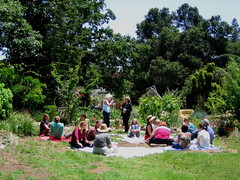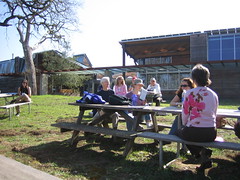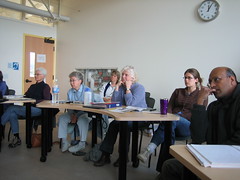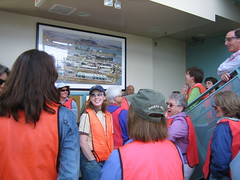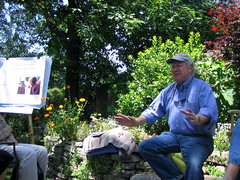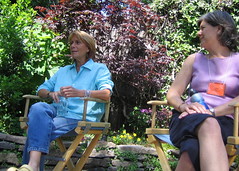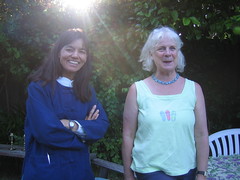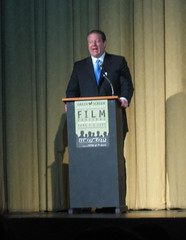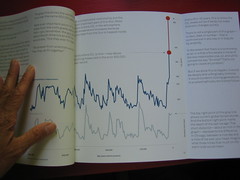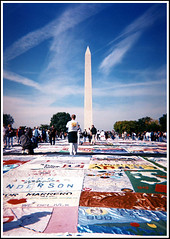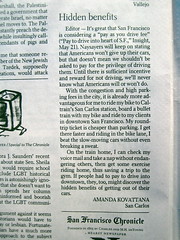Being The Change
How does one "be the change we wish to see in the world"? Twenty-six of us would find out while participating in a new environmental leadership program called "Be The Change" now being offered by Acterra of Palo Alto. Catherine and I were both accepted for the pioneer class last fall. Modeled after a program started in Marin to groom new leadership for the work of saving the environment, we gathered one Friday a month to spend all day listening to speakers, learning our local environmental history and practicing leadership techniques.
Our instructor, Kay O'Neil, had the task of designing the course. She was also our mother hen, providing snacks and chocolate in abundance. Formerly a psychotherapist, she had tired of listening to people come in with the same problems over and over and quit her counseling practice in search of something that would move people forward.
She was assisted by Debbie Mytels, possibly the most well-known community leader in the mid-peninsula. Years ago I had attended the first environmental business networking conference organized by Debbie and the Peninsula Conservation Center (which would later merge with Bay Area Action and become Acterra) It was from Debbie that I learned about the Be The Change program. Both Catherine and I were drawn to the idea of becoming trained leaders in the environmental movement.
Applications required written statements of intention and an interview. Golly, would we be deemed worthy? What if one got in and the other didn't? We were excited to both be accepted. Our classmates were a diverse bunch, ranging from mild mannered to outspokenly radical. Participants came from corporate backgrounds as well as non-profits with professional skills in the tech industry, science, sales, admin, health care and zoology. We were predominantly women, but ranged in age from twenty-something to old enough to be a grandpa. Some were more green than others. This made things interesting.
What, indeed, is an environmentalist? Do we shun SUVs, bottled water and disposable products? Not necessarily, but we did share a willingness to take action. We had all committed to designing and executing some kind of project to solve a specific environmental problem. It was in these projects that we expressed our interests, leveraged our community networks and invested our hopes for change.
I was so stimulated to be among people who had chosen to take a course in environmental leadership that I found myself being outraged and confrontational when they ran contrary to my expectations. I became, exactly what I swore I wouldn't be, a naysayer. I shot down ideas that seemed to rely too much on a technical fix and not on changing the way we lived. I was suspicious when classmates seemed optimistic about corporations becoming green and I was passionate about my own solutions at the expense of others. I ended up shouting down the very people I wanted to be friends with.
I succumbed to being "greener than thou". I was not, until then, in the habit of packing my own dishware, but the class prompted me to show off with visible green practices. I packed dishes and utensils for our catered lunches for Catherine and myself. Kay had thought of it, too, and brought stacks of her own dishes from home for all of us to use. Then hauled them home again. I urged her to ask more of us.
That was the day she brought bottled water for the class in an attempt to respond to all our requests. I was appalled that some class members would even suggest that bottled water be provided for the day. So I wrote my piece on the futility of recycling plastics, the privatization of water and the phenomena of plastic garbage whirling in the ocean and that put an end to that. It was a case of people simply not knowing the issues. So no more bottled water. Kay reminded everyone to bring their own refillable water bottles.
I also made maps for everyone to get from their homes to the train station to facilitate their taking public transit to one of our in town meetings. This was appreciated and, in fact, was my project idea. I wanted to have an online mapping service for cyclists to find their way to public transit and other destinations on bike-safe routes. It was a very sexy idea, but I did not have the skills to execute such a mapping program. The best I was able to do was make paper copies of maps and, with a highlighter, trace out the routes I was familiar with. But as I researched further, I realized the problem was not in getting cyclists to their destination. It was in getting people to get on their bikes at all.
Other participants found similar problems with their visions. Attempts to install programmable thermostats in private homes ran into logistic issues with installers. An idea to provide jobs for teenagers to pump up people's tires for better gas mileage found a dearth of teenagers willing to participate. A mission to get outdated flak jackets, being discarded by the local police, sent to rangers in Africa working to fend off poachers, ran into export restrictions due to concerns about arming terrorists. A letter writing campaign to ask Target to stop using PVC in their packaging was met with polite acknowledgment that they were already aware of the issue.
Some Be The Change participants received encouraging feedback that the solutions they had picked to introduce were well on their way to being implemented. Cities were already working to increase recycling and establish green building codes. We also had success stories. One woman's efforts to save Bayfront Park from a golf course did indeed discourage the development. Buoyed by this experience she decided to run for city council in Menlo Park. Another, enterprising young man, had so thoroughly thought out his solid waste resource management consulting services that he was off to Las Vegas before the program ended, having been hired by casinos to analyze and reduce their waste stream.
There was also less glamorous work accomplished. Catherine got approval from her workplace to start copying on two sides of a sheet of paper. She also scheduled a BBL talk with a global warming scientist who had spoken at Acterra. A certain green synergy began to form around Catherine's leadership. She started a Green Team with other employees who then came up with ideas of their own to conserve energy and consider changes around the workplace. The Palo Alto Weekly, while on assignment for a story on the Be The Change program, interviewed Catherine on her successful green initiatives in a corporate setting.
I, too, started a Green team within my NAPO (National Association of Professional Organizers) chapter. The greening of NAPO turned out to be an idea whose time had come. Soon a NAPO simplicity and sustainability group was formed on a nationwide basis. We are currently brainstorming ideas for eco-organizing workshops to bring to the national conference. When Acterra took us to a local waste management station, my pictures of our tour confirmed, for my organizing colleagues, the limitations of recycling and the need for reducing and reusing.
"What are we thinking of; recycling isn't going to do it," said my contrary classmate, Joel, as we gazed at the mounds of garbage. "We've got to stop consuming stuff." How well I agreed with him and how hard I knew it was to deliver this message. One of our speakers from the San Mateo Recycleworks said she wanted to eventually launch a campaign with the slogan "Just Don't Buy It." Right, I thought, how is such an anti-consumer message going to do down with the business community? Yet, we all knew that something had to give.
Our environmental history had shown that changes had been made, especially here in the Bay Area. During a crucial time in our history, in the 70's, three visionary town council members managed to declare a state of emergency in land development and passed an ordinance forbidding development outside city limits, thus preserving, for us today, the beautiful open space hills that so characterize our landscape. We marveled at the crucial role of local government and participation by people like us.
For our final meeting we were treated to the story of how organic food had progressed from a back-to-the-land, hippie movement of pot growers to a legitimate national organics productions act. Sitting in the lovely garden of Jesse Cool, who owns the Flea St. cafe, I heard Bob Scowcroft, executive director of the Organic Farming Research Foundation, utter the phrase "they said we were communists." Yes, agribusiness saw the whole organic movement as a communist plot to put them out of business. And look at us now. Food for the health of the people and the health of the land itself was now a concept so important that when the government threatened to weaken the standards for organics under pressure from industry, it drew more response from the population than any other issue had before.
Jesse Cool spoke of how, once, nobody cared about organic foods so the concept of a restaurant serving specifically organic food was a nonstarter. Having helped change that perception, she was now turning her attention to waste management - the composting of food waste and reduction of packaging. Yes, having seen the mounds of garbage, I too, was thinking about waste management.
Construction waste is 24% of our total garbage. Could re-using old building materials become a kind of organic construction? Not just green building, which still involved manufacturing new materials, but an ethic of design based entirely around using what was already available, beyond the trophy wood floors from old barns in Vermont.
Be The Change provided me with just the client to find out. Margaret, a fellow participant, wanted organizing help and I persuaded her to let me have a look at her place. She had a charming, two bedroom house where her grown son had come to roost in the attic room and she needed the storage space below reorganized and expanded to keep his mess at bay. At first I was going to bring in the usual factory made closet system, but the thought of all that particleboard and vinyl in an old, wood trimmed house seemed wrong. And for a client who was also an environmentalist, it was wrong. She also wanted a full size guest bed to be incorporated into the tiny room. Was she serious? How would it all fit?
I started drawing, challenged by the idea. Before long I had designed a folding bed from two old doors and a closet for it to roll into, also made from doors. Used doors were readily available on Craig's list and I had plenty of lumber stored over the years that I had saved from going to the dump. It took me days to figure out the details and build the bed, but when it came together it was a marvel of engineering. The bed unfolded with one pull. Margaret was pleased.
I told the story of the closet at our Be The Change graduation day and realized I was onto the beginnings of a new enterprise. A green closet was a sexy idea. I had always loved designing and building, but had been increasingly repelled by the thought of all those trees cut down for new construction. Now that I had found a community that would be interested in re-using old materials, the wheels had started to turn.
As we collected our diplomas, signed by Barbara Boxer who had taken the Environmental Forum program in Marin, I realized that the most important part of the program was us; my classmates and I reacting to what we had seen and heard over the ten months and to each other. Our endeavors, whether successful or not, had impacted our individual communities and shed light on our concerns for the planet. We had become point people for the environment, agents of change. Our leadership had been recognized. We would not turn back easily now and pretend we were nonchalant bystanders during this time of planetary crisis.
Acterra is now recruiting applicants for their program which starts in September. The deadline for applications is July 31st.
